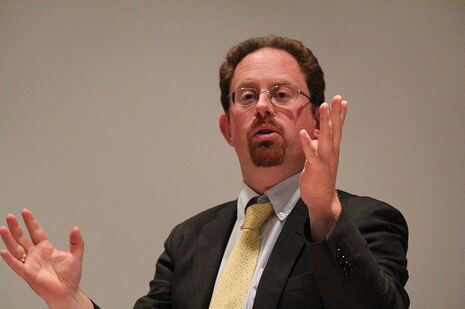Interview: Julian Huppert
Daniel Simpson talks to Cambridge MP Julian Huppert about AstraZeneca, European elections and the Living Wage Campaign

The local and European elections are approaching, parliament is grilling a major pharmaceutical company about a proposed multi-million pound investment in Cambridge, and Varsity’s Living Wage campaign is at last beginning to take effect. So this week seemed as good a time as any to talk to Cambridge’s Liberal Democrat MP, Julian Huppert.
Huppert has been in the role since 2010. The MP studied Biological Chemistry during his own days at Cambridge, and in 2009 became a fellow of Clare, where I arranged to meet him. Huppert (‘call me Julian’) strolled in, greeted a few porters, and breezily used his card to let me into the room I was supposed to have booked for the interview. Having grown up and studied in Cambridge, the city he now represents, Huppert is very well placed to speak volumes about matters both town and gown.
I begin by asking Huppert about the American pharmaceutical company Pfizer’s proposed merger with Britain’s AstraZeneca, which recently hit the news. Only the day before, Vince Cable pointed to Huppert’s expertise on the matter, as a former research scientist, and stated that “Cambridge has never needed him so much”. Huppert is steadfastly against the merger, which he fears threatens the proposed £330 million investment, and 2,100 jobs, that AstraZeneca has pledged to the city:
“It is a really important issue for the country, for Cambridge, and for students”, Huppert insists. “If the takeover happens, it would be the biggest ever takeover of a UK company, and the scale is massive, we’re talking over £60 billion, which is a flabbergasting scale: it’s a thousand pounds for every person in the country”.
But should students care, I ask? “It will have a direct impact on the prospects for people in particular disciplines, and will be a longer term issue about the future of Britain”, he replies. “This matters for students who work in STEM subjects, natscis, chem-eng, all of those subjects, because this could be their employment - even if you don’t work directly for a pharmaceutical company, the supply chains, the companies they work with, the biotechs around it, the pure research that they fund, is affected by this decision”.
Pfizer has pledged to protect the Cambridge investment, and insists that the two companies’ combined power would be an advantage, but Huppert is unconvinced:
“We need to find a way to make sure [their commitment] is absolutely binding. I would prefer to have two separate companies both wanting to be in Cambridge, because of what we offer. When these takeovers happen you almost always lose jobs [and] if you have one company as the major pharmaceutical in, lets say, Cambridge, if its leaves...then this would be a huge blow”.
I move the conversation on because, thankfully, not every student is a natsci or a chemical engineer. The European elections will take place next week, so what of Richard Howitt MEP’s remark, to Varsity’s own Hesham Mashour, that Nick Clegg’s recent TV debate with Nigel Farage “put his own interests before the European cause”, and that Clegg “would have done much better not to give UKIP that lift”?:
“I think one of the big debates that needs to be had is whether we want to be in Europe or not”, Huppert fires back. “What’s happened for years is that they [UKIP] have just been left unchallenged, as the party of saying ‘we can do it a bit better, just don’t ask us too much about the details’”.
He continues: “their [Labour’s] party political broadcasts, their election material, have desperately tried to avoid mentioning the word Europe, which I think is really, frankly bizarre...I realise he [Ed Miliband] has a problem almost as big as David Cameron’s, whose party is also completely split. So I think there’s only one party that is arguing ‘we are definitely for Europe, we think it is a benefit to this country and we are proud to say that’”.
Huppert then underlines the importance of getting students involved in the upcoming elections:
“The polling suggests for the East of England, for this area, that of the seven seats that are available, the seventh seat will either go to UKIP or to the Lib Dems...the key question students should think is do they want the seat to go to UKIP or would they rather have a Lib Dem? We know the problems with UKIP, some of the xenophobia that they have, some of the homophobia, all of those awful things...and their sheer negativity”.
So Huppert thinks that UKIP is an xenophobic, and a homophobic, party, I ask?:
“There are certainly people within UKIP who very clearly are. We’ve just had one of the minority leaders of their youth wing quit because they are just being so anti-immigrant...they made all this fuss about Romanians and Bulgarians flooding in to take our jobs, and actually it turns out they’ve left since because they can go to other countries as well”.
Huppert reminds me that the local council elections are of an equal significance: “Local elections do really matter and students should get involved in them. I mean, what councilors do can have a real effect on student life. Definitely vote”.
Finally, we get on to the subject of the Living Wage in Cambridge, which Varsity spent a lot of time campaigning for earlier this year:
“I think it [the campaign] is a really good thing”, says Huppert, “it’s frustrating that there’s such slow progress, and i’ve spoken to a number of the organisations around the university and tried to push in a less confrontational way, as it were, and I think we’re getting there gradually and slowly. Clare has made some changes, it’s a great shame at Trinity, where I use to be, that the steward there, as I understand it, has decided that it’s just too expensive: yes, it costs you money but it’s better for your staff, so I think it’s something which the university ought to do”.
Huppert recounts the tale of Caffe Sicilia, which “opened recently and I believe is the only cafe in Cambridge to pay the living wage, and they’ve done phenomenally well - and one of the things they’ve said is that they get really good staff and they keep really good staff because they’re paying that bit more”.
He finishes, “we should talk more closely about how to work together...there are slightly different approaches for a newspaper and for an MP, and we should make sure they work together”.
Is Huppert saying that Varsity’s campaigning was too brash? Probably, but we’re very pleased to hear he thinks so.
 News / ‘Out of the Ordinary’ festival takes over Cambridge 26 August 2025
News / ‘Out of the Ordinary’ festival takes over Cambridge 26 August 2025 News / Council rejects Wolfson’s planned expansion28 August 2025
News / Council rejects Wolfson’s planned expansion28 August 2025 News / Tompkins Table 2025: Trinity widens gap on Christ’s19 August 2025
News / Tompkins Table 2025: Trinity widens gap on Christ’s19 August 2025 Comment / Who could possibly want more exams?25 August 2025
Comment / Who could possibly want more exams?25 August 2025 Sport / Return to your childhood sport! 29 August 2025
Sport / Return to your childhood sport! 29 August 2025









